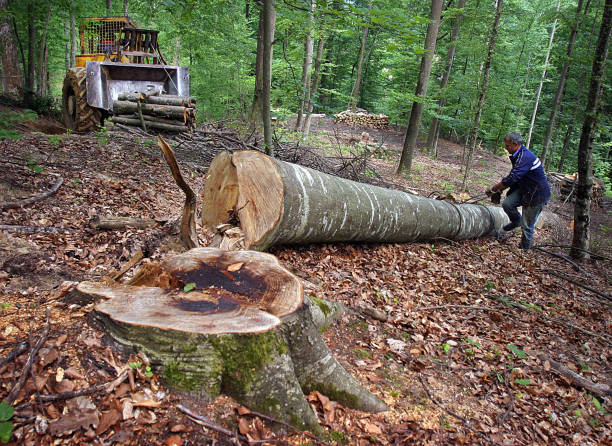How many jobs are available in forest products? The forest products industry plays a vital role in our economy, providing a wide range of products that are essential to our daily lives.
From lumber used in construction to paper products and biomass energy, this sector encompasses a diverse array of goods derived from our forests.
Beyond the tangible products, the industry also has a significant impact on job creation, offering employment opportunities across various disciplines and skill sets.
In this era of increasing environmental consciousness and sustainability, the forest products industry has gained even more significance.
As we seek to strike a balance between economic development and responsible resource management, understanding the job market within this sector becomes crucial.
This article aims to explore the question: How many jobs are available in forest products?
Whether you are a job seeker, industry professional, or simply curious about the employment landscape in this sector, this article will provide valuable information to help you navigate the world of forest products careers.
Also Read:
How Many Jobs Are Available in Professional Services?
How Many Jobs Are Available in Auto Parts O.E.M.?
How Many Jobs Are Available in Forest Products?
The forest products industry is a significant contributor to employment, offering a wide array of job opportunities across different sectors and regions.
While it is challenging to provide an exact number of jobs available in this industry, it is evident that it supports a substantial workforce globally.
The employment potential in forest products is diverse and encompasses various roles.
From forestry professionals managing the sustainable cultivation and harvesting of timber to workers involved in the manufacturing and processing of wood products, such as carpenters, sawmill operators, and woodworkers, there is a wide range of jobs directly tied to the sector.
Additionally, the industry creates indirect employment opportunities in sectors like transportation, logistics, marketing, and sales.
Job availability in the forest products industry is influenced by several factors.
These include the size and health of the forest resources, market demand for wood and related products, technological advancements that affect productivity, and government policies and regulations pertaining to forestry and land management.
The job market in forest products is also influenced by regional variations.
Countries with abundant forest resources and a strong emphasis on forestry management tend to have more employment opportunities.
Regions with a higher concentration of timber mills, manufacturing facilities, and timber-dependent industries also tend to offer a larger number of jobs in this sector.
Furthermore, the increasing focus on sustainable practices and the utilization of forest biomass for renewable energy generation has created new job prospects in areas such as bioenergy production, forest restoration, and ecosystem services.
Overall, while precise figures may vary depending on geographical location and market conditions, the forest products industry remains a significant source of employment, supporting a diverse range of careers and contributing to economic growth and environmental sustainability.
Skill Requirements and Training for Forest Products Jobs
Forest products jobs require a range of skills and specialized training.
Proficiency in forestry management, including knowledge of tree species, growth patterns, and sustainable harvesting practices, is essential.
Technical skills in operating machinery and equipment used in logging and wood processing are also valuable.
Additionally, expertise in quality control, safety protocols, and environmental regulations is crucial.
Many positions may require certifications, such as forest management or chainsaw operation.
Ongoing professional development and staying up-to-date with industry advancements are important for career growth.
Vocational training programs, community colleges, and industry associations offer courses and certifications to equip individuals with the necessary skills for successful careers in the forest products industry.
Challenges and Opportunities in the Forest Products Industry
The forest products industry faces both challenges and opportunities in its continued growth and sustainability.
Challenges include balancing economic development with responsible resource management, addressing environmental concerns, and navigating regulatory complexities.
The industry must also adapt to market fluctuations, technological advancements, and changing consumer preferences.
However, these challenges also present opportunities.
Embracing sustainable practices, investing in research and innovation, and diversifying product offerings can lead to competitive advantages.
Additionally, the growing demand for renewable materials, increased focus on environmental stewardship, and the potential for job creation in rural areas provide significant opportunities for the forest products industry to thrive and contribute to a greener, more sustainable future.
Also Read:
How Many Jobs Are Available in Advertising?
How Many Jobs Are Available in Department/Specialty Retail Stores?
Conclusion
The forest products industry offers a diverse range of employment opportunities, contributing significantly to the global workforce.
While it is challenging to determine the exact number of jobs available in the sector, it is evident that forestry, wood processing, and related industries provide substantial employment.
The industry’s job market is influenced by factors such as market demand, technological advancements, government policies, and regional variations.
Skill requirements and specialized training play a crucial role in accessing and succeeding in forest products careers.
Despite challenges, such as environmental concerns and market fluctuations, the industry presents promising opportunities through sustainable practices, innovation, and renewable material demands.
The forest products industry continues to be a vital sector for job seekers, professionals, and the overall economy, creating a dynamic landscape of employment possibilities.






